
IT MIGHT AS WELL BE SPRING: A CONCERT RECAP
by Todd Brandt of Stirred Straight Up
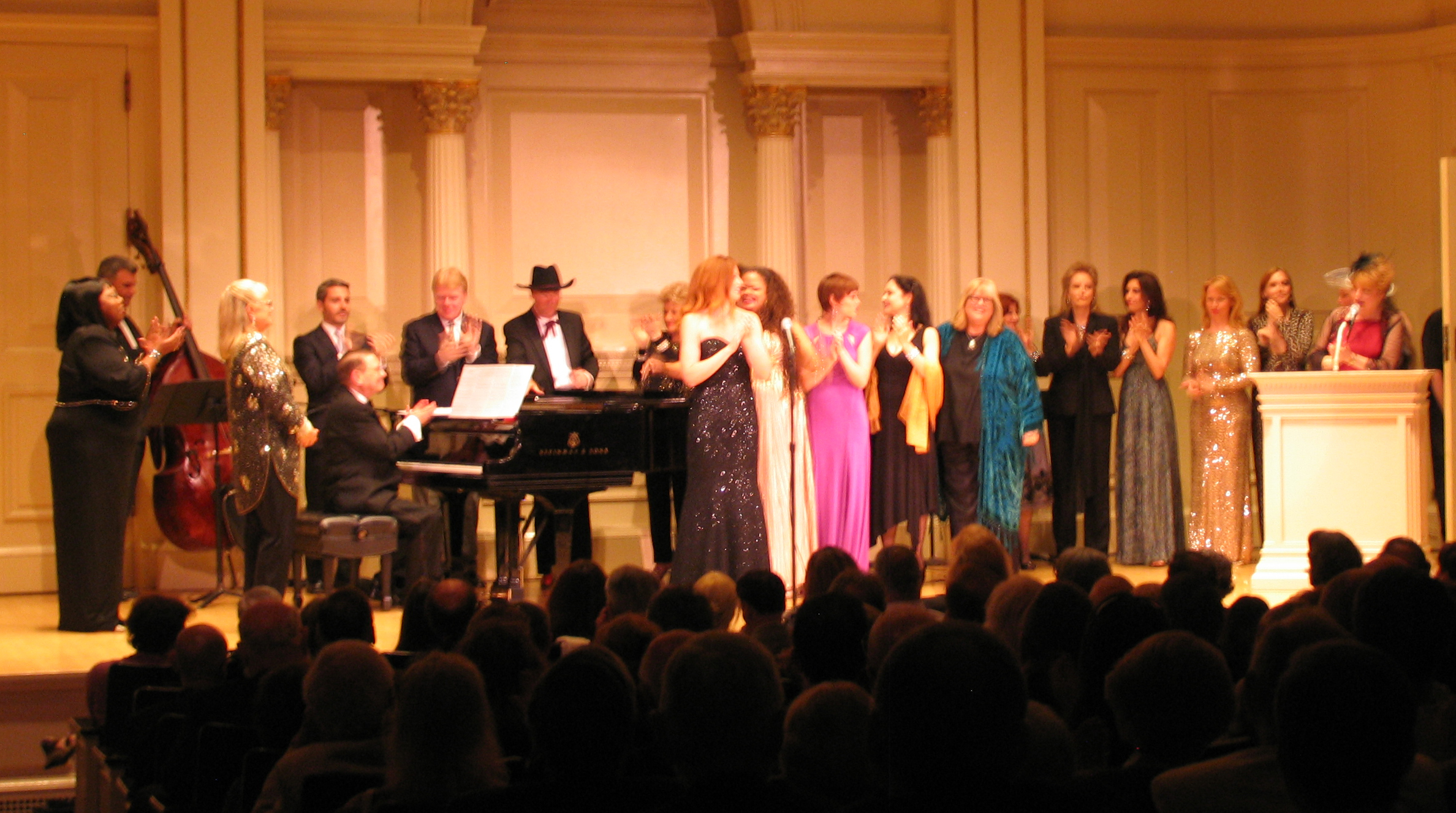
Last night, we had the good fortune to attend an absolutely fantastic tribute show to Margaret Whiting at Carnegie Hall’s Weill Recital Hall. It was such a wonderful, lengthy program, with so many excellent performances, that we shall keep it to bullet points about each performer — and, again, we must stress that the entire program was simply superb. We were stunned by how beautifully it was cast and programmed; not one clinker in the bunch, which, as some of you may know, is definitely not the norm for most benefit/tribute shows. Margaret’s daughter (and the evening’s co-host) Debbi Whiting, the brilliant musical director Tex Arnold, along with John Fricke, KT Sullivan, Rick Meadows and Jason Martin who were instrumental in putting the nuts and bolts of this show together must be praised to the skies for their efforts.
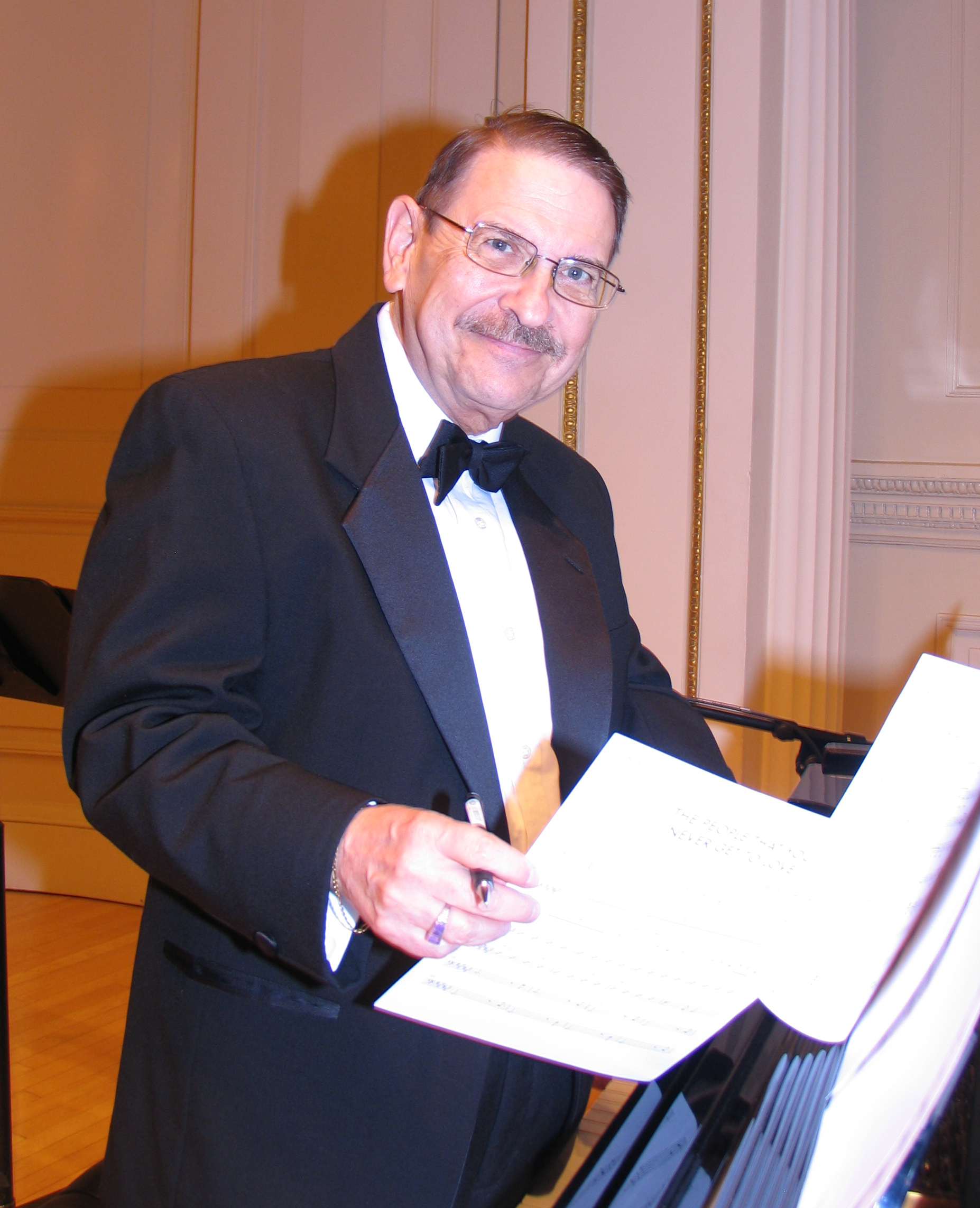 Hubert “Tex” Arnold: The musical director of this glorious occasion, and a longtime accompanist to Margaret Whiting, Mr. Arnold provided the perfect tone and setting for this event. His is a truly elegant, musical style which can only enhance the performers for whom he is playing. Hubert “Tex” Arnold: The musical director of this glorious occasion, and a longtime accompanist to Margaret Whiting, Mr. Arnold provided the perfect tone and setting for this event. His is a truly elegant, musical style which can only enhance the performers for whom he is playing.
Carole J. Bufford: We caught a glimpse of Ms. Bufford’s act a few years back at The Metropolitan Room, and it was clear then that she had a lot going for her: a big, lustrous voice; expressive stage technique; and an elegant, glamorous persona. All of these qualities have culminated in full flower, and she was a commanding, stylish presence. Her full-bodied renditions of “It Might as Well Be Spring” and “Any Place I Hang My Hat is Home” were heartily appreciated by the audience, as were Ms. Bufford’s eye-catching four costume changes, all stunning.
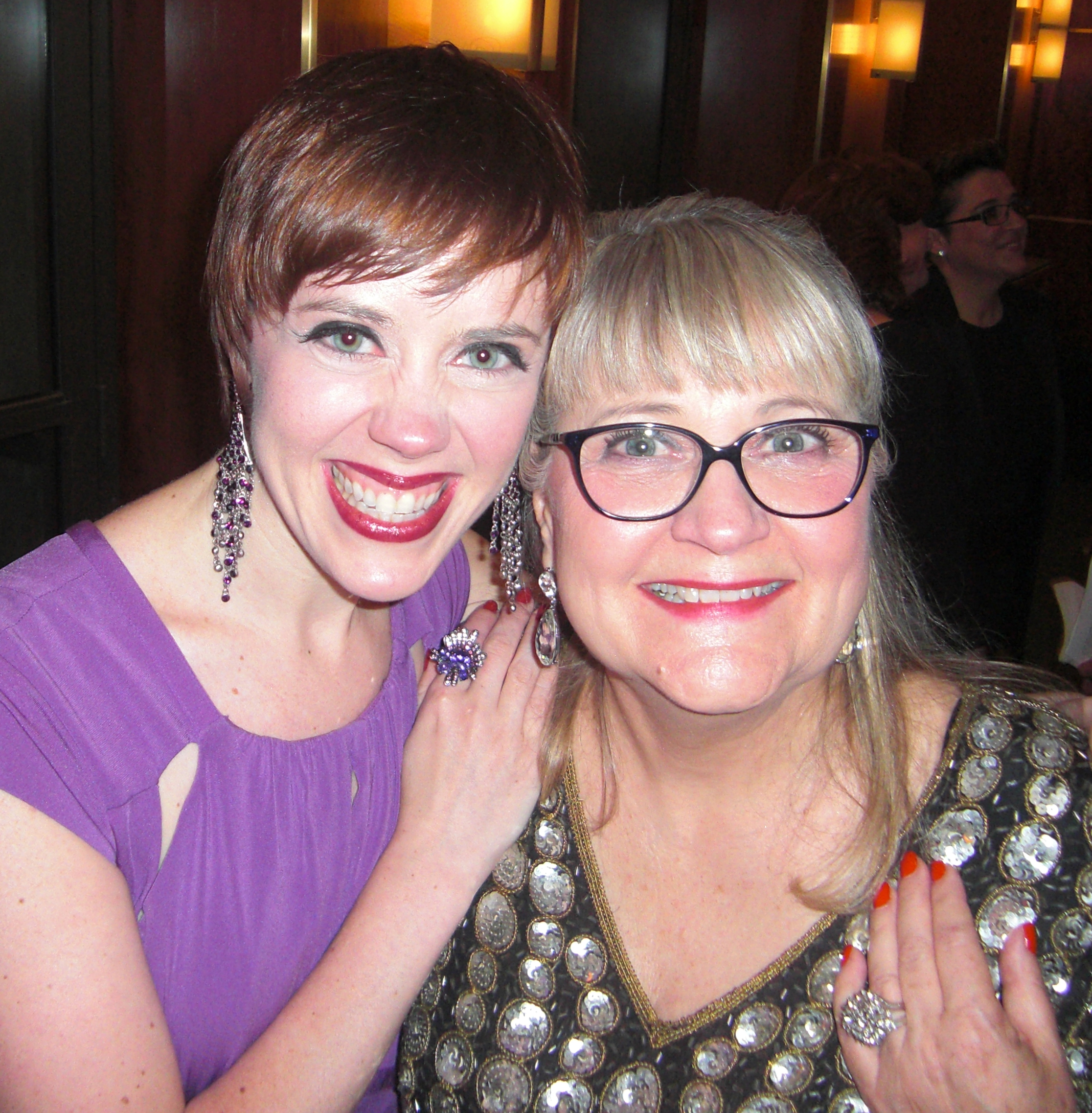
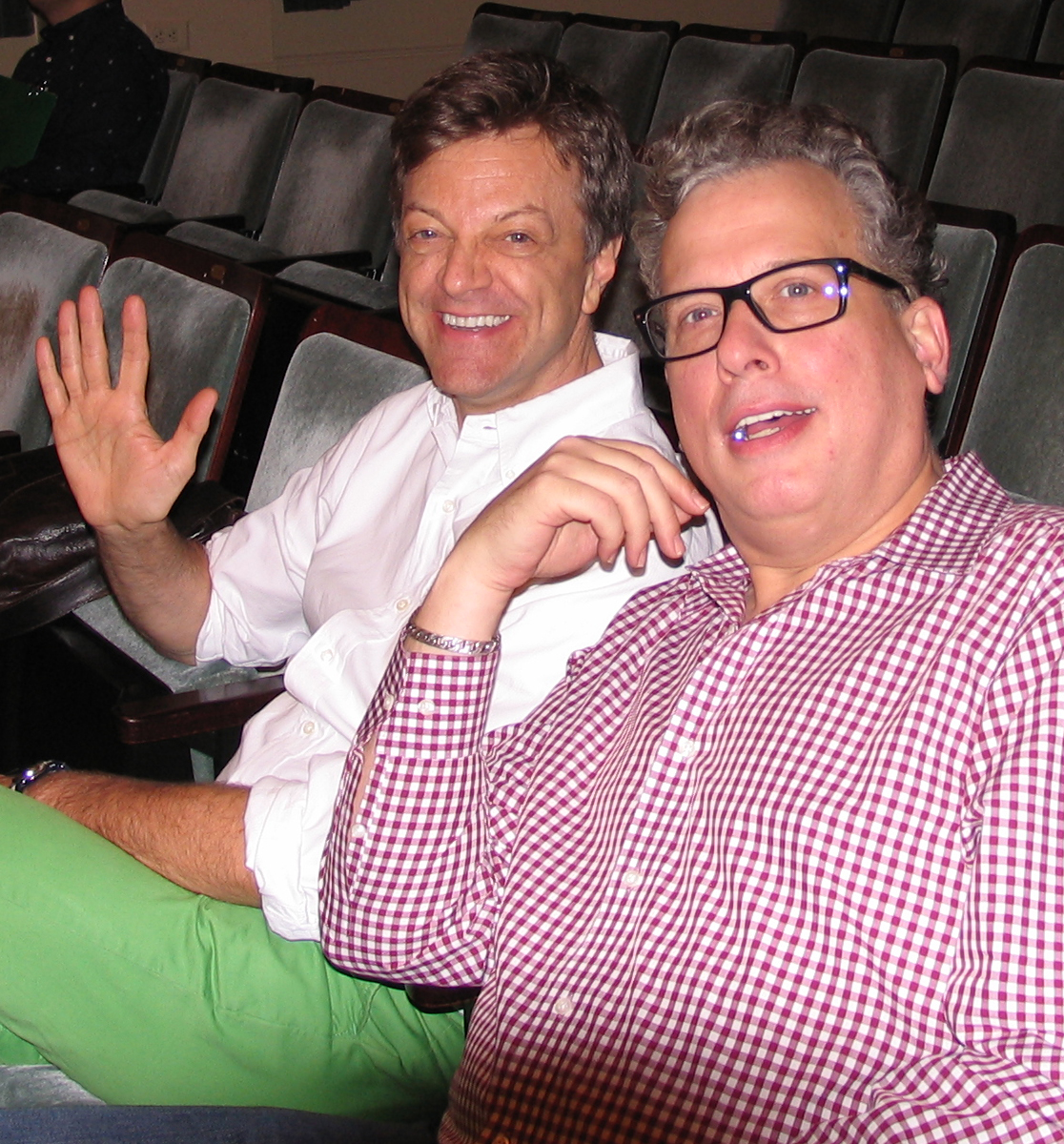 Jim Caruso and Billy Stritch: These two gentlemen are such masters of their crafts, and watching them perform together is sheer joy. Duetting on a medley of two of Margaret’s later hits, which began with a lovely “Far Away Places” and wound up with a hot, swingin’ rendition of “The Gypsy in My Soul,” Jim and Billy took their respective turns in the spotlight (Billy singing and playing on the piano, Jim ever the effortlessly stylish and dapper showman), but really dazzled the audience with their harmonies. We only wish they had performed one or two more songs. (Oh, and memo to Billy: we loved your Maggie Isn’t Margaret Anymore line — and next time, I think you should end the medley with a rousing “Winchester Cathedral” or “There’s a Kind of Hush” singalong.) Jim Caruso and Billy Stritch: These two gentlemen are such masters of their crafts, and watching them perform together is sheer joy. Duetting on a medley of two of Margaret’s later hits, which began with a lovely “Far Away Places” and wound up with a hot, swingin’ rendition of “The Gypsy in My Soul,” Jim and Billy took their respective turns in the spotlight (Billy singing and playing on the piano, Jim ever the effortlessly stylish and dapper showman), but really dazzled the audience with their harmonies. We only wish they had performed one or two more songs. (Oh, and memo to Billy: we loved your Maggie Isn’t Margaret Anymore line — and next time, I think you should end the medley with a rousing “Winchester Cathedral” or “There’s a Kind of Hush” singalong.)
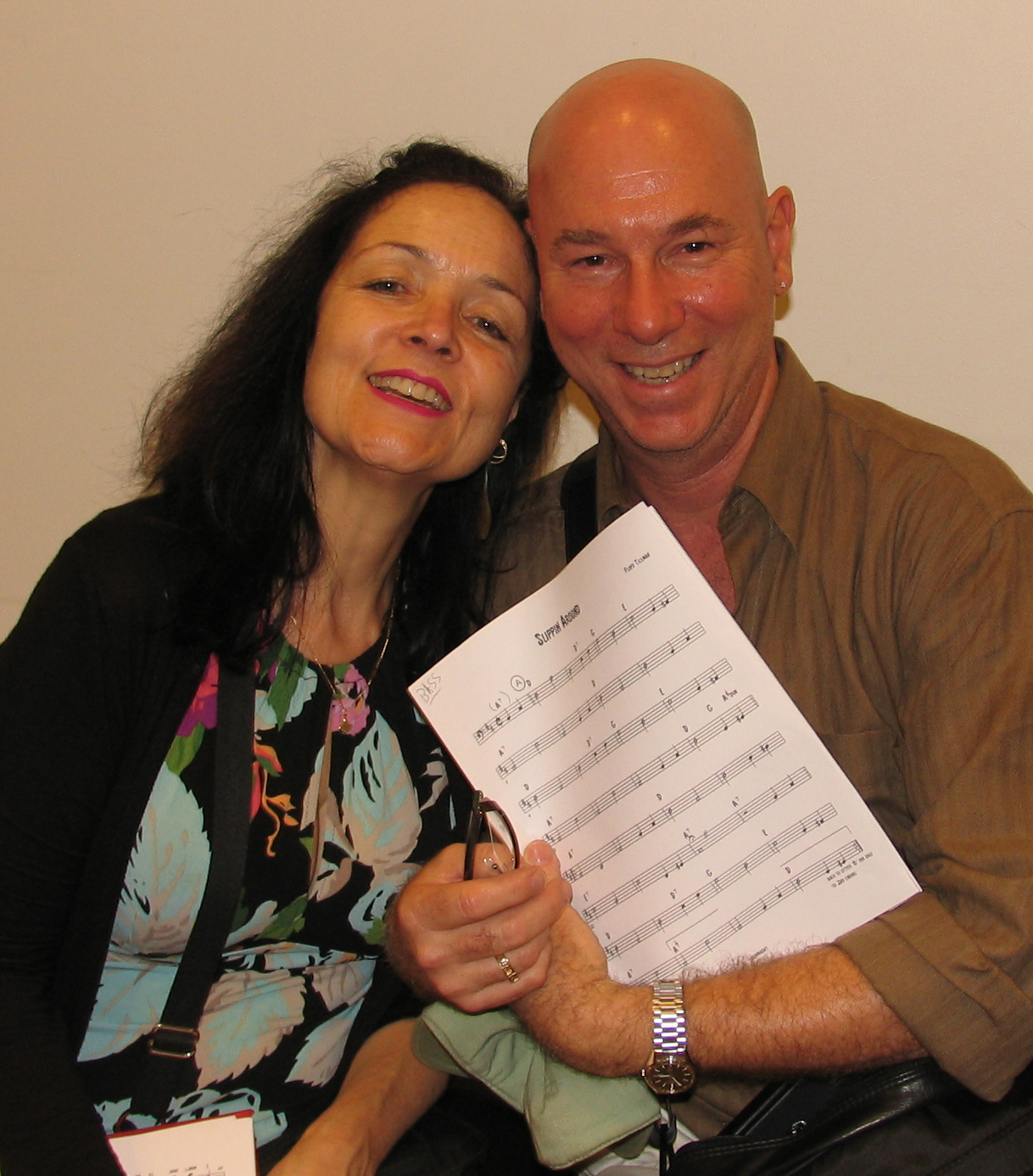 Mary Foster Conklin: Besides duetting with Wayne Hosford on a fun rendition of Margaret’s first #1 country hit with Jimmy Wakley (“Slipping Around”), Ms. Conklin — of whom we were previously unaware, and who bears a striking resemblance to Bebe Neuwirth — also performed a dramatic version of “Ballad of the Sad Young Men,” that (in)famous Fran Landesman dirge which some contemporary critics call the musical equivalent of “The Boys in the Band.” But some, the fine folk at SSUWAT included, consider it one of the finest songs of all time, and, frankly, it’s nearly as truthful and timely today as it was in the pre-Stonewall era it was written in. (Margaret, incidentally, must have been one of THE first vocalists to record it, back in 1960, for her Past Midnight! album. Aside from one other recording by Anita O’Day a year later, most singers were either unaware of the song, or leery of its content, and it didn’t begin receiving wider recognition until much later, post-Stonewall, namely by Roberta Flack and Shirley Bassey.) It was a treat to hear it performed live, and believe us, darlings, looking around the audience, quite a few “sad young men [who are] growing old” were wiping away tears after Ms. Conklin finished. Mary Foster Conklin: Besides duetting with Wayne Hosford on a fun rendition of Margaret’s first #1 country hit with Jimmy Wakley (“Slipping Around”), Ms. Conklin — of whom we were previously unaware, and who bears a striking resemblance to Bebe Neuwirth — also performed a dramatic version of “Ballad of the Sad Young Men,” that (in)famous Fran Landesman dirge which some contemporary critics call the musical equivalent of “The Boys in the Band.” But some, the fine folk at SSUWAT included, consider it one of the finest songs of all time, and, frankly, it’s nearly as truthful and timely today as it was in the pre-Stonewall era it was written in. (Margaret, incidentally, must have been one of THE first vocalists to record it, back in 1960, for her Past Midnight! album. Aside from one other recording by Anita O’Day a year later, most singers were either unaware of the song, or leery of its content, and it didn’t begin receiving wider recognition until much later, post-Stonewall, namely by Roberta Flack and Shirley Bassey.) It was a treat to hear it performed live, and believe us, darlings, looking around the audience, quite a few “sad young men [who are] growing old” were wiping away tears after Ms. Conklin finished.
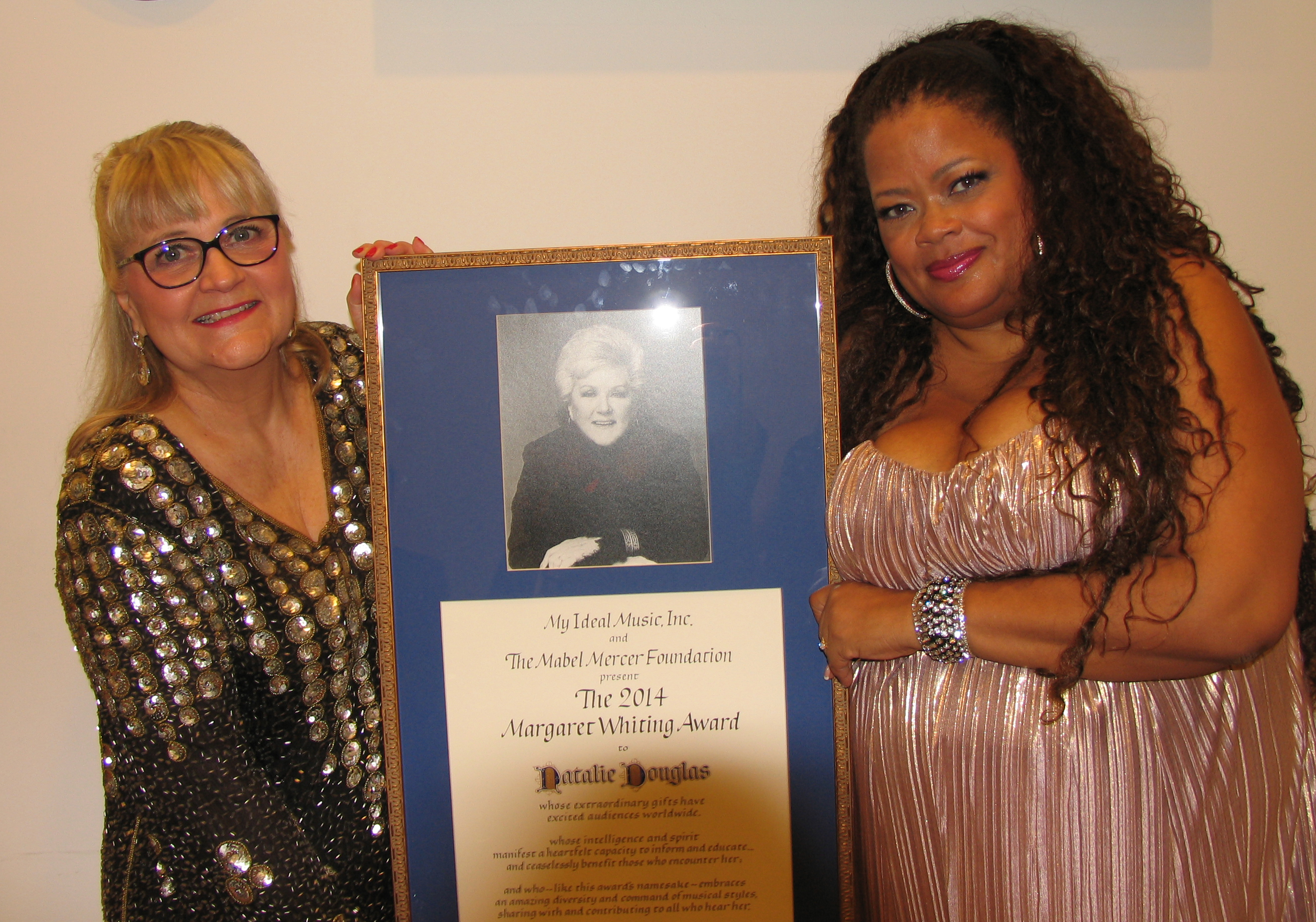 Natalie Douglas: We have been privileged to have watched and followed this amazing talent almost from the very beginning of our time in New York City, twenty years ago. We first heard Natalie when she was a hard working singing waitress at The Duplex in the Village and Brandy’s on the Upper East Side. Even then, to our callow ears, we knew that she was destined for much bigger and better things, and her truckload of awards and rave reviews bear witness to our good taste! We recall, in those early years, Natalie would, with good humor and finesse, firmly refuse to honor requests to sing, say, “And I Am Telling You I’m Not Going,” which customers would ask for based solely on the fact that she is a.) black, and b.) a larger woman. Beyond the vaguely insulting assumption that she should be singing that song, Natalie’s voice is less gospel grit than crystal clear beauty, yet with dazzling reserves of power. She proved that by closing the first half of last evening with a stunning, soaring “Can’t Help Lovin’ That Man,” recorded by Margaret for her classic Sings the Jerome Kern Song Book album, and of course, introduced by the legendary soprano Helen Morgan in Show Boat. Natalie Douglas: We have been privileged to have watched and followed this amazing talent almost from the very beginning of our time in New York City, twenty years ago. We first heard Natalie when she was a hard working singing waitress at The Duplex in the Village and Brandy’s on the Upper East Side. Even then, to our callow ears, we knew that she was destined for much bigger and better things, and her truckload of awards and rave reviews bear witness to our good taste! We recall, in those early years, Natalie would, with good humor and finesse, firmly refuse to honor requests to sing, say, “And I Am Telling You I’m Not Going,” which customers would ask for based solely on the fact that she is a.) black, and b.) a larger woman. Beyond the vaguely insulting assumption that she should be singing that song, Natalie’s voice is less gospel grit than crystal clear beauty, yet with dazzling reserves of power. She proved that by closing the first half of last evening with a stunning, soaring “Can’t Help Lovin’ That Man,” recorded by Margaret for her classic Sings the Jerome Kern Song Book album, and of course, introduced by the legendary soprano Helen Morgan in Show Boat.
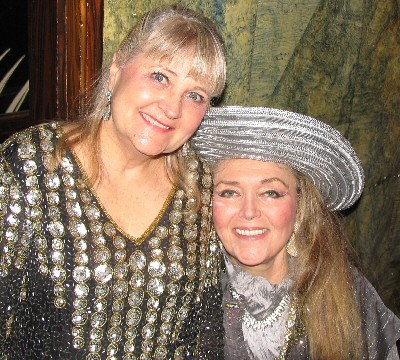 Baby Jane Dexter: Full disclosure, and with all due respect: this cabaret legend has always left us cold. We found her performances overwrought and her persona not larger than life, but simply overbearing. It’s all a matter of personal taste — Ms. Dexter has enough fans, awards, and raving critics to not give a flying fig about what we think! But last night, Baby Jane absolutely floored us with a beautiful, deeply felt interpretation of Peter Allen and Carole Bayer Sager’s “I’d Rather Leave While I’m in Love.” Like Margaret did, Dexter manages to cut through the inherent 1970’s pop schlock of the material, and find surprising nuances and hidden, penetrating truths in lyrics which, in other hands, could merely come across as cheap sentiment. It was a lovely, lovely performance. Dexter, whose vocal range and physical mobility have both been severely limited in recent years by ill health, seemed to have to rely more on interpretive skill than primal roaring (which is how we can only describe how we felt about earlier performances we’d seen), and the effect was spellbindingly effective. Baby Jane Dexter: Full disclosure, and with all due respect: this cabaret legend has always left us cold. We found her performances overwrought and her persona not larger than life, but simply overbearing. It’s all a matter of personal taste — Ms. Dexter has enough fans, awards, and raving critics to not give a flying fig about what we think! But last night, Baby Jane absolutely floored us with a beautiful, deeply felt interpretation of Peter Allen and Carole Bayer Sager’s “I’d Rather Leave While I’m in Love.” Like Margaret did, Dexter manages to cut through the inherent 1970’s pop schlock of the material, and find surprising nuances and hidden, penetrating truths in lyrics which, in other hands, could merely come across as cheap sentiment. It was a lovely, lovely performance. Dexter, whose vocal range and physical mobility have both been severely limited in recent years by ill health, seemed to have to rely more on interpretive skill than primal roaring (which is how we can only describe how we felt about earlier performances we’d seen), and the effect was spellbindingly effective.
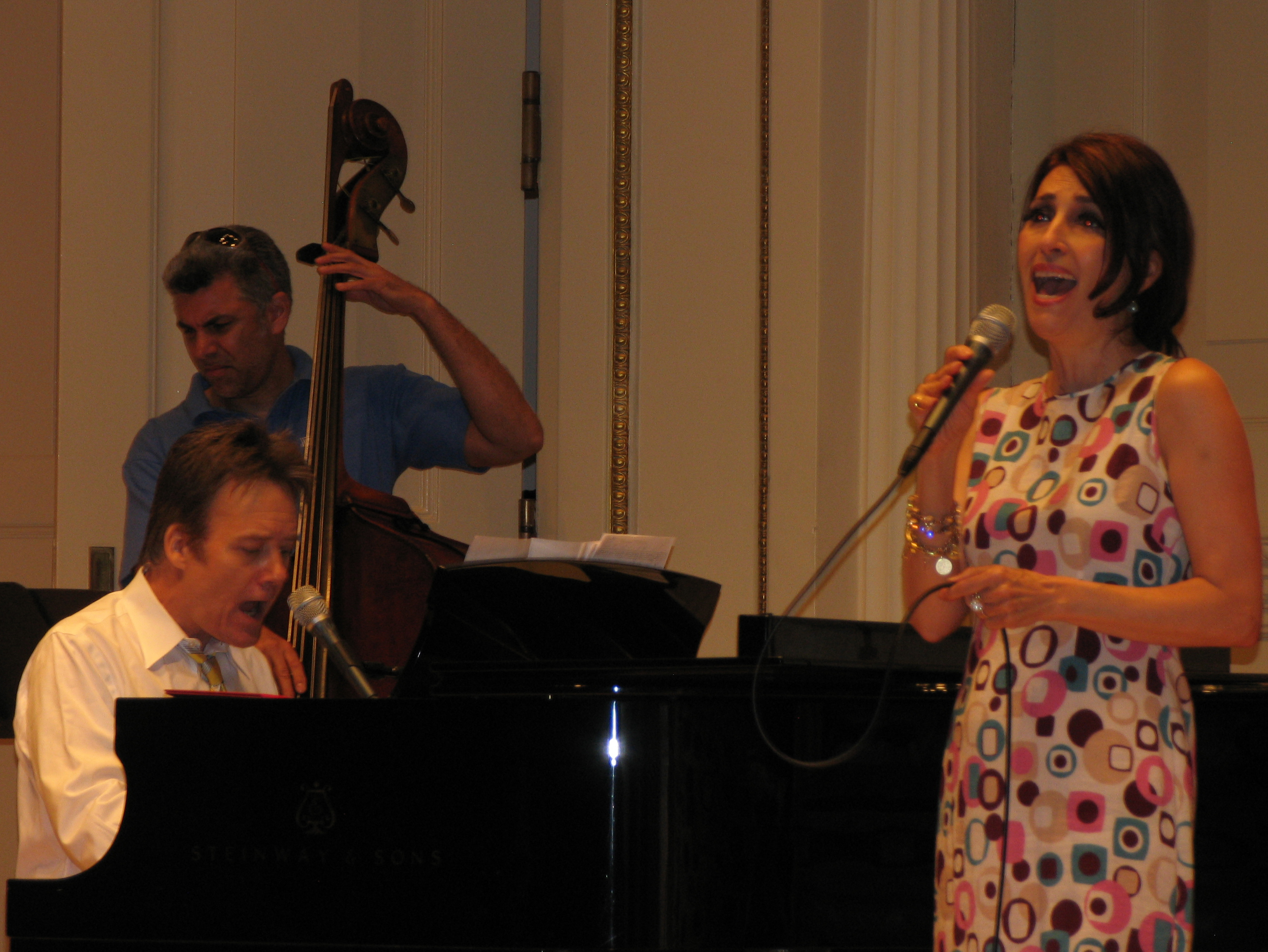 Eric Comstock: A throwback to the nonchalant elegance of a Fred Astaire, Mr. Comstock’s sprightly piano-and-vocal performance of “You Couldn’t Be Cuter” led to one of the cutest moments of the evening: as he played and sang, we noticed the quite elderly lady sitting a row ahead of us suddenly come alive, bouncing her head to the music and singing along word for word. It, and Mr. Comstock’s performance, was utterly delightful. Eric Comstock: A throwback to the nonchalant elegance of a Fred Astaire, Mr. Comstock’s sprightly piano-and-vocal performance of “You Couldn’t Be Cuter” led to one of the cutest moments of the evening: as he played and sang, we noticed the quite elderly lady sitting a row ahead of us suddenly come alive, bouncing her head to the music and singing along word for word. It, and Mr. Comstock’s performance, was utterly delightful.
Barbara Fasano: One of Margaret Whiting’s signature hits is the lovely “Moonlight in Vermont,” which we never noticed, until Ms. Fasano pointed it out in her introduction, doesn’t contain one single rhyming lyric! Yet it’s so perfectly constructed, it sounds as if it does, and Ms. Fasano’s elegant, precise phrasing made the most of those beautiful lyrics. She was also joined by Eric Comstack for a wonderful, jaunty duet of “Ain’t We Got Fun?”
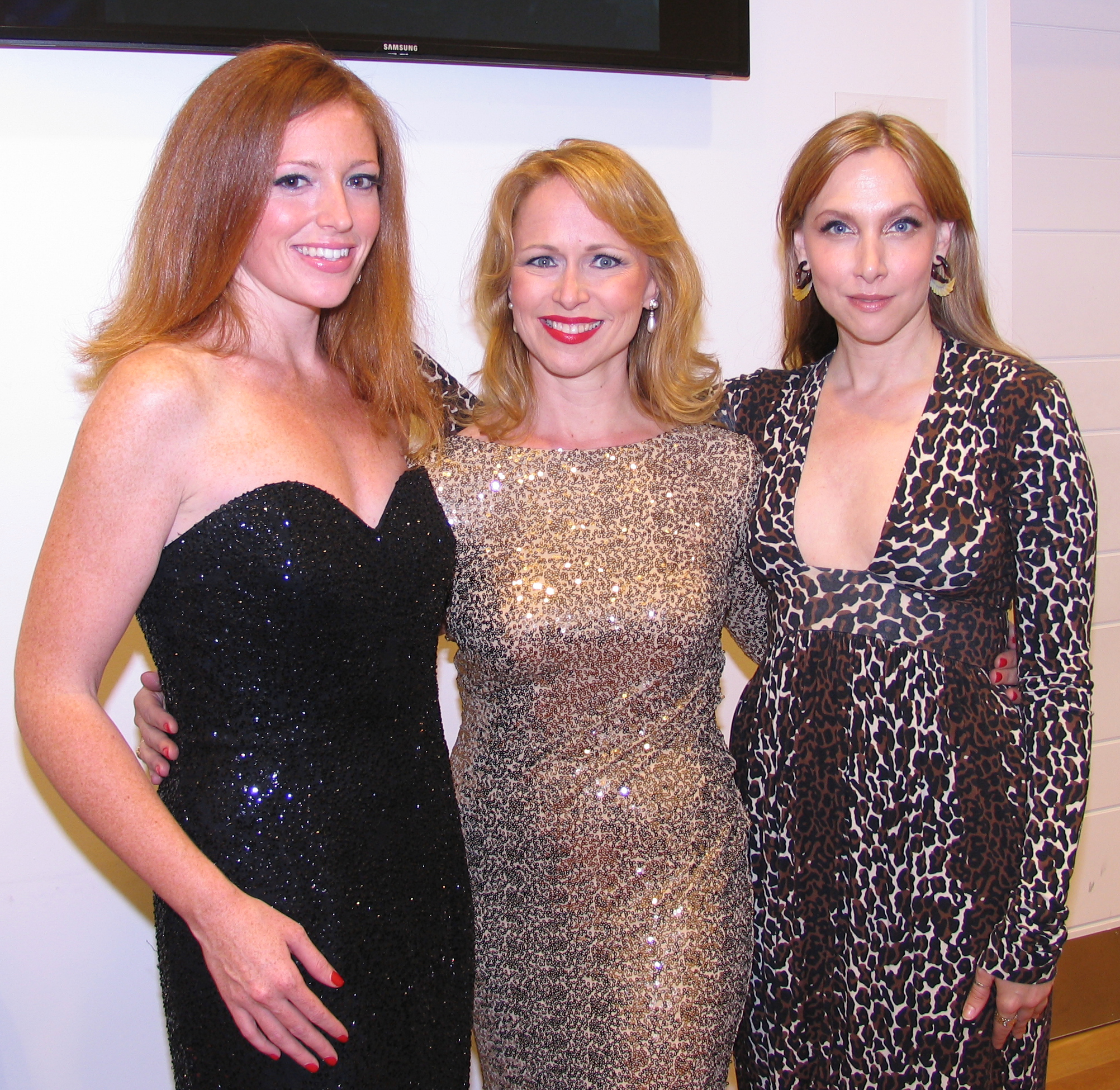 Lauren Fox: One of the hallmarks of Margaret Whiting’s career was versatility; and her inroads into the world of country music were not only commercially successful, but also wholly credible: unlike many pop stars who attempted to conquer that field, Whiting both gained the respect of the tough-to-crack Nashville old guard, and introduced her more mainstream audience to the likes of Hank Williams. Tall, cool, and serene, Ms. Fox performed a wistful rendition of Williams’ “I Can’t Help It (if I’m Still in Love with You)” with an affecting fragility. Lauren Fox: One of the hallmarks of Margaret Whiting’s career was versatility; and her inroads into the world of country music were not only commercially successful, but also wholly credible: unlike many pop stars who attempted to conquer that field, Whiting both gained the respect of the tough-to-crack Nashville old guard, and introduced her more mainstream audience to the likes of Hank Williams. Tall, cool, and serene, Ms. Fox performed a wistful rendition of Williams’ “I Can’t Help It (if I’m Still in Love with You)” with an affecting fragility.
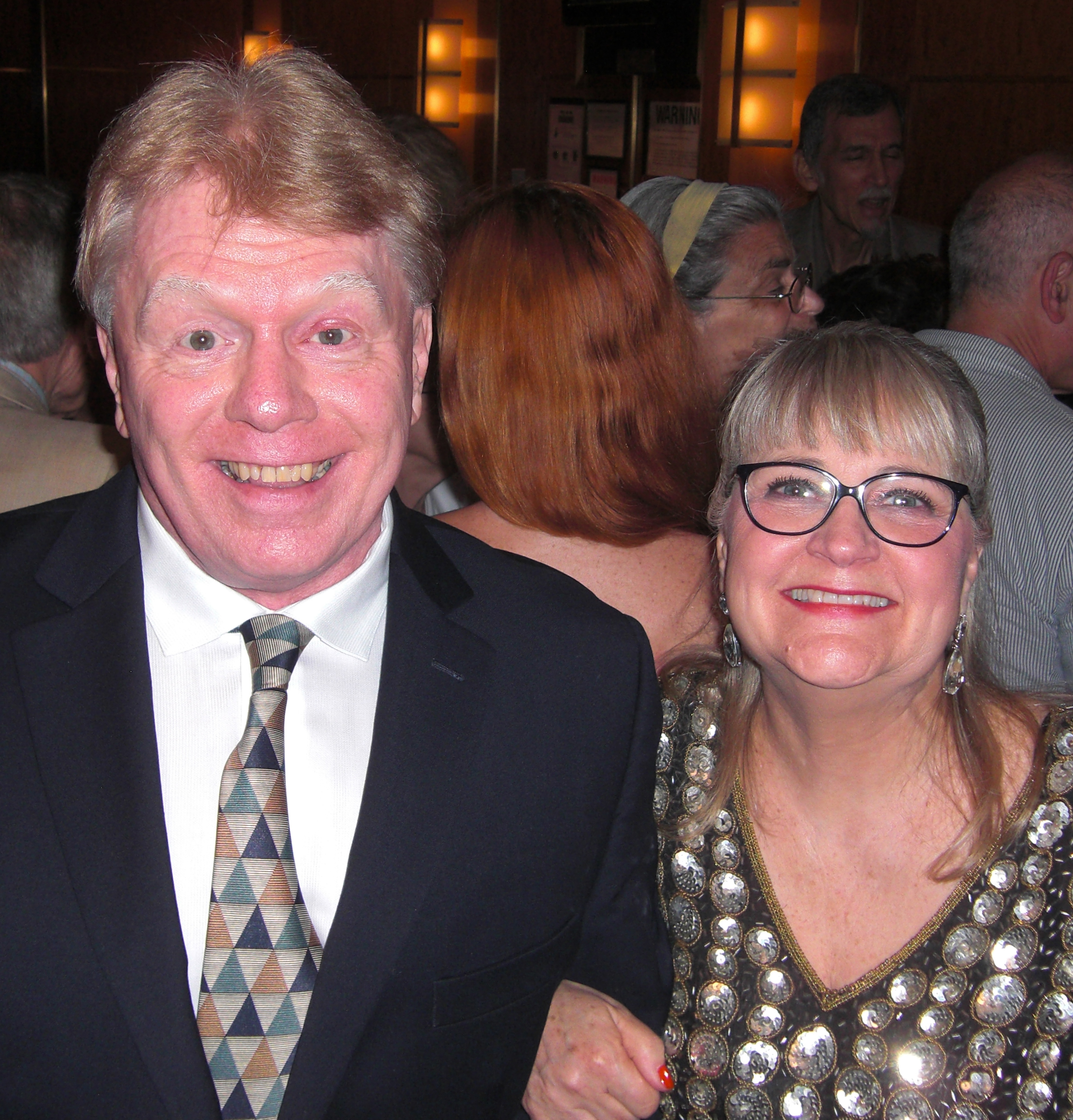 John Fricke and K.T. Sullivan: Many Judy Garland fans know of Mr. Fricke as one of the Garland historians par excellence. What we sure as hell didn’t know was that he can also sing! Fricke and co-hostess Sullivan did a charming duet version of a show-stopping medley Margaret would perform in her club act, comprised of the hit songs that her father, Richard Whiting, had written. Beginning with “Till We Meet Again,” winding up with a rousing “Beyond the Blue Horizon,” and packing in “Breezin’ Along with the Breeze,” “On the Good Ship Lollipop,” and “Too Marvelous for Words” in between, the enthusiastic, boyishly wide-eyed Fricke seemed almost awe struck at sharing the Carnegie stage with the celebrated cabaret vet Sullivan (whose madcap, 1930’s persona was in delightfully full throttle all evening), yet held his own admirably. Fun, fun, fun. John Fricke and K.T. Sullivan: Many Judy Garland fans know of Mr. Fricke as one of the Garland historians par excellence. What we sure as hell didn’t know was that he can also sing! Fricke and co-hostess Sullivan did a charming duet version of a show-stopping medley Margaret would perform in her club act, comprised of the hit songs that her father, Richard Whiting, had written. Beginning with “Till We Meet Again,” winding up with a rousing “Beyond the Blue Horizon,” and packing in “Breezin’ Along with the Breeze,” “On the Good Ship Lollipop,” and “Too Marvelous for Words” in between, the enthusiastic, boyishly wide-eyed Fricke seemed almost awe struck at sharing the Carnegie stage with the celebrated cabaret vet Sullivan (whose madcap, 1930’s persona was in delightfully full throttle all evening), yet held his own admirably. Fun, fun, fun.
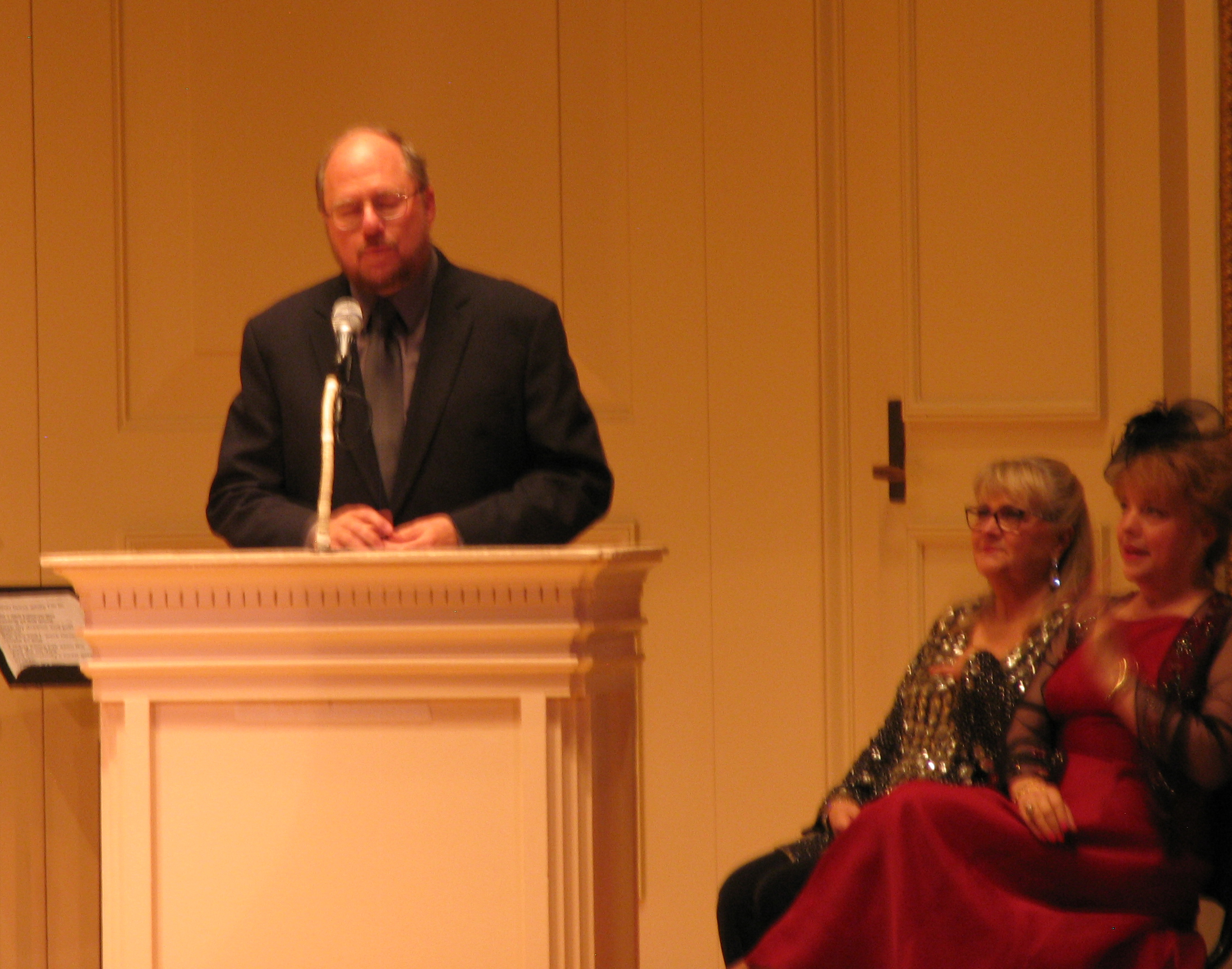
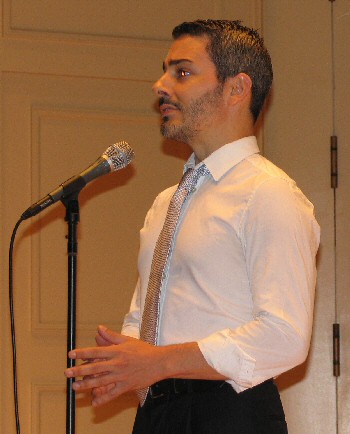 Eric Yves Garcia: This ridiculously beautiful man could probably just stand still on a stage without singing or playing a note, and people would still pay admission to see him. But he’s talented, too, gosh darn it, which really means that life is terribly, terribly unfair. Garcia sang a wistful ballad from Rupert Holmes‘ musical, The Mystery of Edwin Drood (Mr. Holmes was in the audience, and introduced Garcia after a very sweet anecdote about how Margaret “discovered” him), “The People You Don’t Get to Love,” with an oh-so-slight world-weary rasp in his voice which suggested a young man beginning his trek down the path of the Sinatra of In the Wee Small Hours, No One Cares, Sings for Only the Lonely, etc. Picking up the tempo and the mood, Garcia then took to the keys to accompany himself on a sprightly, delightful “You’d Better Love Me” from the musical High Spirits. Did we mention that he’s beautiful? Eric Yves Garcia: This ridiculously beautiful man could probably just stand still on a stage without singing or playing a note, and people would still pay admission to see him. But he’s talented, too, gosh darn it, which really means that life is terribly, terribly unfair. Garcia sang a wistful ballad from Rupert Holmes‘ musical, The Mystery of Edwin Drood (Mr. Holmes was in the audience, and introduced Garcia after a very sweet anecdote about how Margaret “discovered” him), “The People You Don’t Get to Love,” with an oh-so-slight world-weary rasp in his voice which suggested a young man beginning his trek down the path of the Sinatra of In the Wee Small Hours, No One Cares, Sings for Only the Lonely, etc. Picking up the tempo and the mood, Garcia then took to the keys to accompany himself on a sprightly, delightful “You’d Better Love Me” from the musical High Spirits. Did we mention that he’s beautiful?
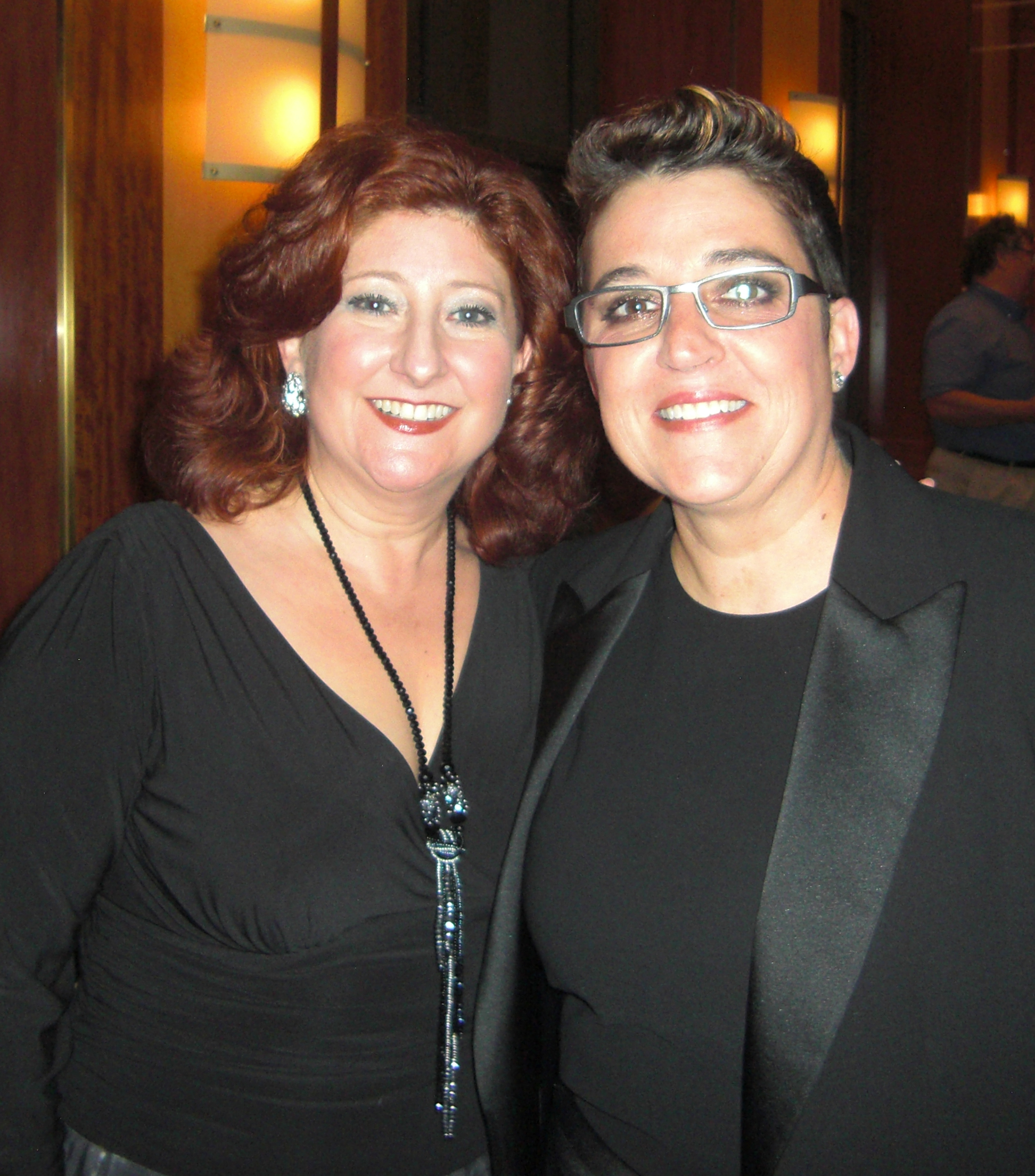 Terese Genecco and Shaynee Rainbolt: Unlike many of her contemporaries, Margaret Whiting somehow escaped the fate of being inextricably tied to an inexplicably popular novelty song: there was pop fluff in her catalog, to be sure, but she didn’t have to gamely give her public a concert version of “C’mon-a My House,” “How Much is That Doggie in the Window,” or “The Rock and Roll Waltz” against her will and better judgement. So it was that the one “comedy” number in the last night’s repertoire was of the high order of Frank Loesser’s “Baby, it’s Cold Outside,” which Margaret made into a standard with the aid of Johnny Mercer, moonlighting from his day job as lyricist extraordinaire. Terese Genecco and Shaynee Rainbolt performed it to comic perfection, giving it a winking, thoroughly modern twist. Terese Genecco and Shaynee Rainbolt: Unlike many of her contemporaries, Margaret Whiting somehow escaped the fate of being inextricably tied to an inexplicably popular novelty song: there was pop fluff in her catalog, to be sure, but she didn’t have to gamely give her public a concert version of “C’mon-a My House,” “How Much is That Doggie in the Window,” or “The Rock and Roll Waltz” against her will and better judgement. So it was that the one “comedy” number in the last night’s repertoire was of the high order of Frank Loesser’s “Baby, it’s Cold Outside,” which Margaret made into a standard with the aid of Johnny Mercer, moonlighting from his day job as lyricist extraordinaire. Terese Genecco and Shaynee Rainbolt performed it to comic perfection, giving it a winking, thoroughly modern twist.
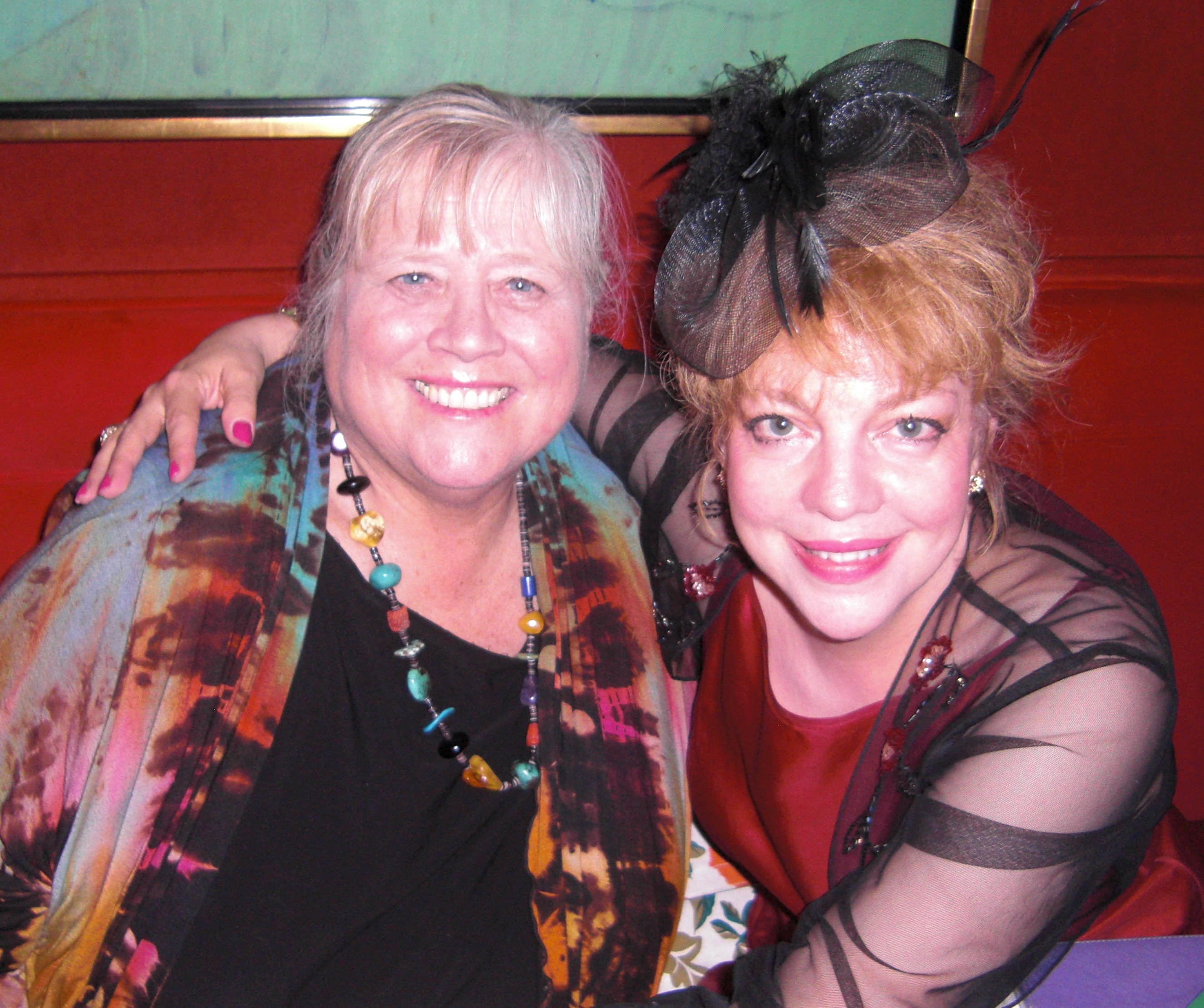 Heather MacRae: We’re ashamed to admit that we had no idea that the daughter of Gordon and Sheila MacRae was still an active performer. Thus, we had no idea what to expect, especially since the warm, motherly-looking person who took to the stage was in such contrast to the be-gowned, be-jeweled women who had preceded her. Then Heather opened her mouth, and out poured a heartbreakingly beautiful “My Favorite Year,” which left much of the audience (and our hostesses) awash in tears. We need to find out more about this lady, and when and if she’s performing again. She was that good. Heather MacRae: We’re ashamed to admit that we had no idea that the daughter of Gordon and Sheila MacRae was still an active performer. Thus, we had no idea what to expect, especially since the warm, motherly-looking person who took to the stage was in such contrast to the be-gowned, be-jeweled women who had preceded her. Then Heather opened her mouth, and out poured a heartbreakingly beautiful “My Favorite Year,” which left much of the audience (and our hostesses) awash in tears. We need to find out more about this lady, and when and if she’s performing again. She was that good.
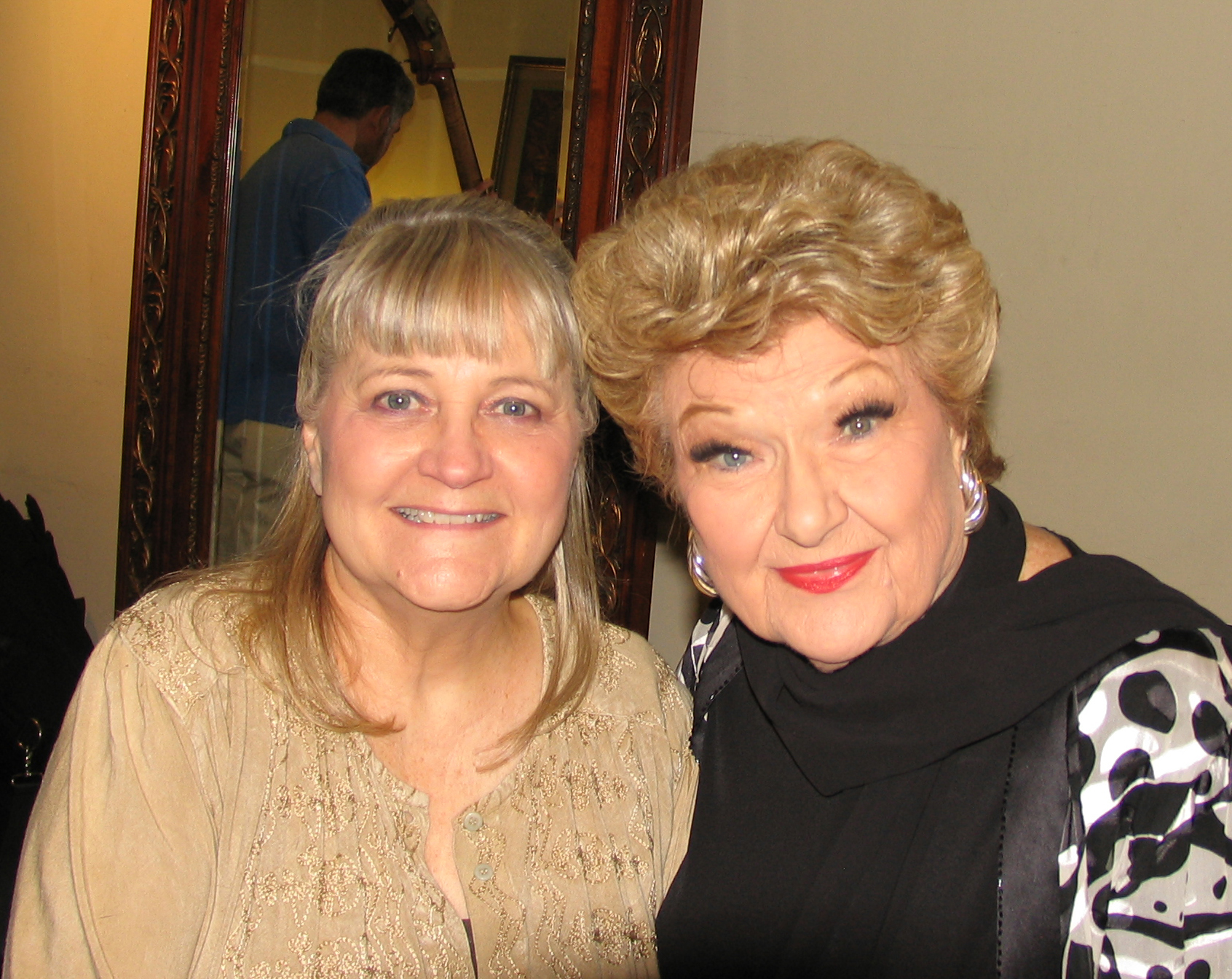 Marilyn Maye: Really, what more can we say, that we haven’t already said about the one and only Miss Maye? The Great Lady came, she saw, she paid tribute to Margaret, she conquered Carnegie — again. The last time she played there, it was to honor Stephen Sondheim on his 80th birthday, and she drew a standing ovation for her “I’m Still Here.” And last night, MMM (marvelous Marilyn Maye) earned yet another standing ovation — the only one for a single performer — for her three-song set of Johnny Mercer songs, “Drinking Again,” “One for My Baby (and One More for the Road)” and “Blues in the Night.” The level of professionalism, charisma, and complete mastery of the stage and her craft which La Maye displays simply leaves nearly everyone else in the dust. Introducing Maye to the stage, daughter Debbi Whiting mentioned that Margaret’s last public outing was to see Marilyn perform at The Metropolitan Room. We were there that night; prior to the show, we had dinner next door to the Metropolitan, and Margaret and her party were seated next to us. She looked glamorous and beautiful, but obviously very, very frail. We were also seated next to her party at the Metropolitan; and when Marilyn introduced Margaret to the audience, the place exploded. And when Marilyn had us all join in a singalong of “Hello, Maggie” to the tune of “Hello, Dolly,” Margaret just lit up and beamed. It was one of our most unforgettable experiences. Marilyn Maye: Really, what more can we say, that we haven’t already said about the one and only Miss Maye? The Great Lady came, she saw, she paid tribute to Margaret, she conquered Carnegie — again. The last time she played there, it was to honor Stephen Sondheim on his 80th birthday, and she drew a standing ovation for her “I’m Still Here.” And last night, MMM (marvelous Marilyn Maye) earned yet another standing ovation — the only one for a single performer — for her three-song set of Johnny Mercer songs, “Drinking Again,” “One for My Baby (and One More for the Road)” and “Blues in the Night.” The level of professionalism, charisma, and complete mastery of the stage and her craft which La Maye displays simply leaves nearly everyone else in the dust. Introducing Maye to the stage, daughter Debbi Whiting mentioned that Margaret’s last public outing was to see Marilyn perform at The Metropolitan Room. We were there that night; prior to the show, we had dinner next door to the Metropolitan, and Margaret and her party were seated next to us. She looked glamorous and beautiful, but obviously very, very frail. We were also seated next to her party at the Metropolitan; and when Marilyn introduced Margaret to the audience, the place exploded. And when Marilyn had us all join in a singalong of “Hello, Maggie” to the tune of “Hello, Dolly,” Margaret just lit up and beamed. It was one of our most unforgettable experiences.
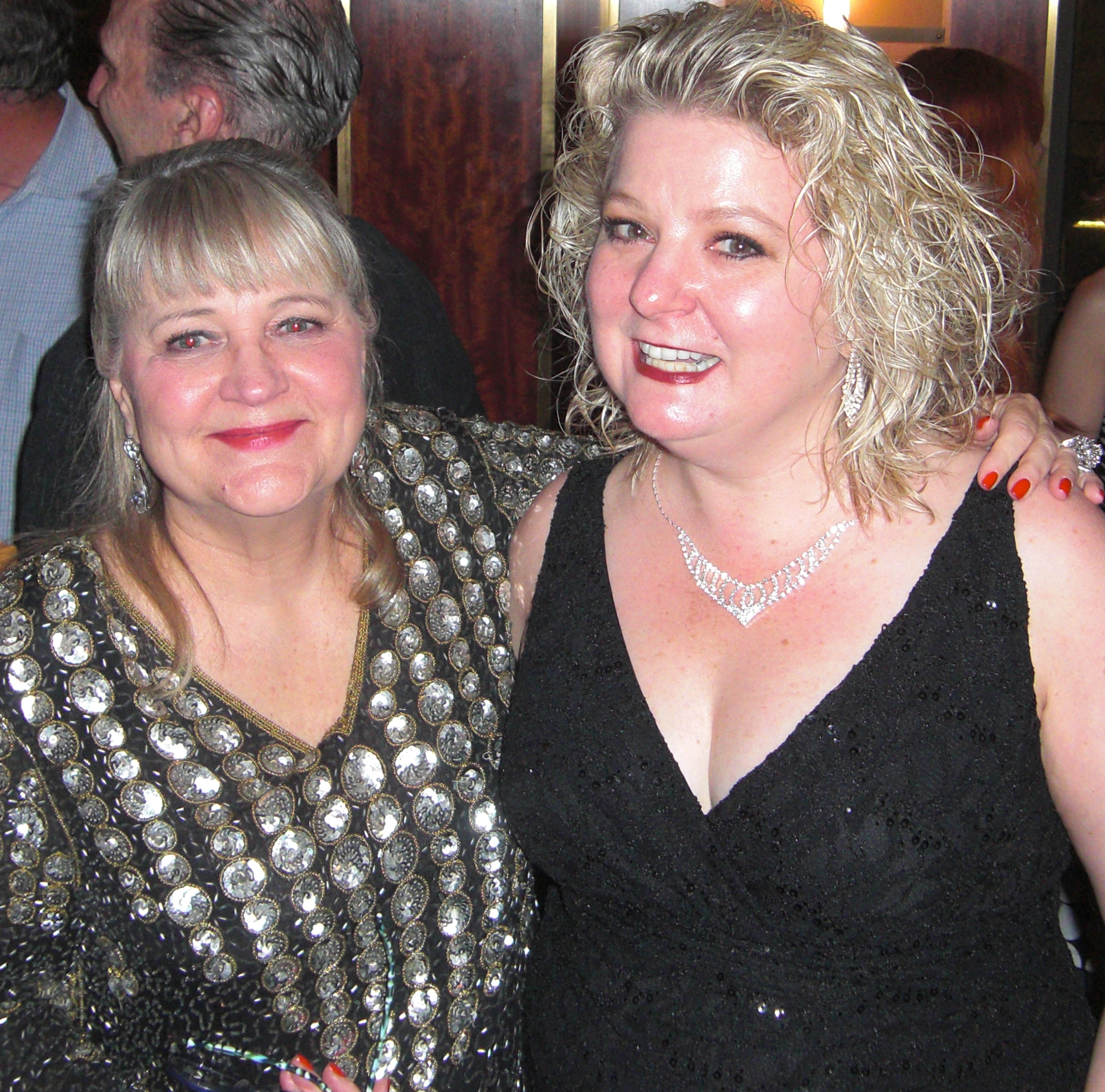 Tanya Moberly: One of the finest songs in the latter-day cabaret canon is Francesa Blumenthal’s devastating “The Lies of Handsome Men,” of which Margaret quipped, “Honey, that’s my life.” Ms. Moberly began the song with a wryly comic, self-deprecating air, which had turned to eviscerating regret by the song’s end. It was a wrenching, touching performance. Tanya Moberly: One of the finest songs in the latter-day cabaret canon is Francesa Blumenthal’s devastating “The Lies of Handsome Men,” of which Margaret quipped, “Honey, that’s my life.” Ms. Moberly began the song with a wryly comic, self-deprecating air, which had turned to eviscerating regret by the song’s end. It was a wrenching, touching performance.
Marissa Mulder: A gorgeous redhead poured into a slinky gown, Ms. Mulder was the essence of 1940’s glamour when she opened the program with an unfettered, beautifully shaped performance of “My Ideal,” Margaret’s first hit at Capitol when she was but a teenager. In spite of her sophisticated looks, Ms. Mulder still perfectly captured the youthful longing — perhaps still lingering in all of us, regardless of age — in those lyrics, which had been penned by Leo Robin to a melody by Margaret’s father, Richard.
Karen Oberlin: Looking resplendent in a glittering gold gown, Ms. Oberlin came out, sang simply, and simply stunned. Nothing more was needed. Jerome Kern’s “Remind Me” is one of our all time favorite songs, and this interpretation was just perfect. No frills, no excess, no unnecessary drama: just a pitch perfect, wonderfully phrased, beautifully executed performance of a masterful example of the Great American Songbook — which, really, is the essence of Margaret Whiting.
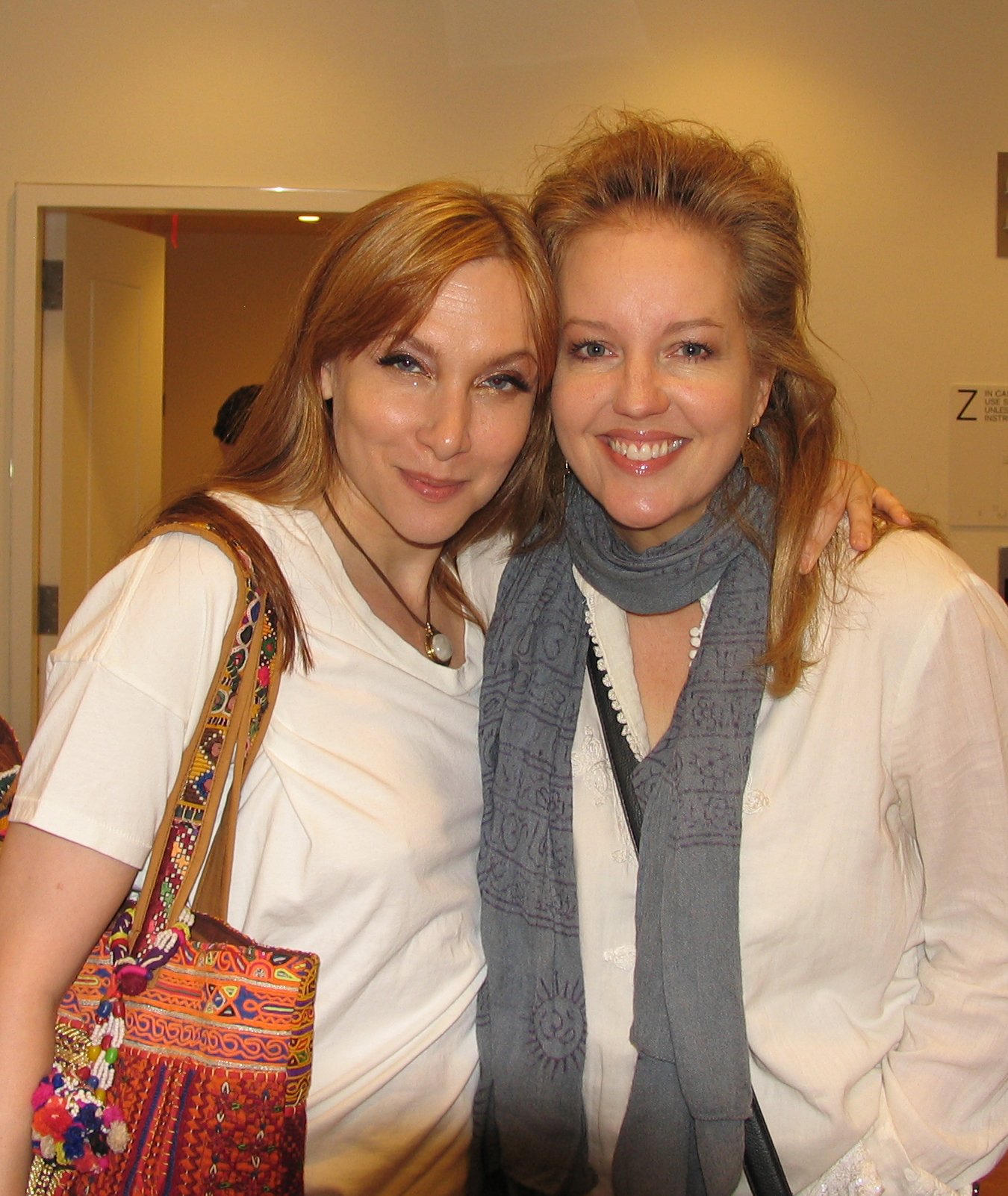 Stacy Sullivan: Proving that talent and taste are genetic, K.T. Sullivan’s sister, Stacy, gave us an excellent medley of Harold Arlen’s “That Old Black Magic” ingeniously interspersed with Rodgers and Hart’s “Lover.” Her sexy, sultry, swinging, cool-hot performance called to mind the best of Margaret’s former Capitol label mate, Miss Peggy Lee — which shouldn’t be a surprise, as Ms. Sullivan’s tribute to Lee has received multiple awards and accolades. Stacy Sullivan: Proving that talent and taste are genetic, K.T. Sullivan’s sister, Stacy, gave us an excellent medley of Harold Arlen’s “That Old Black Magic” ingeniously interspersed with Rodgers and Hart’s “Lover.” Her sexy, sultry, swinging, cool-hot performance called to mind the best of Margaret’s former Capitol label mate, Miss Peggy Lee — which shouldn’t be a surprise, as Ms. Sullivan’s tribute to Lee has received multiple awards and accolades.
Carol Woods: This Broadway vet (currently treading the boards as Matron “Mama” Morton in the long-running revival of Chicago) brought flair and sass to the devil-may-care lyrics of John Meyer’s “I’d Like to Hate Myself in the Morning” — a gin-soaked anthem originally written for, and performed to a fare-the-well, by Judy Garland in the last years of her life. It also was a wonderful summation of the glamorous, larger-than-life Margaret of the 1970’s and 1980’s, painting Manhattan all shades of vermillion into the night. Ms. Woods capped the evening with a magnificent “Come Rain or Come Shine” by those maestros, Harold Arlen and Johnny Mercer.

Saadi Zain: Besides the brilliant accompaniment and direction of Tex Arnold, special mention should go to Mr. Zain on bass, who made Carnegie Hall’s stately, refined Weill Recital Hall swing.
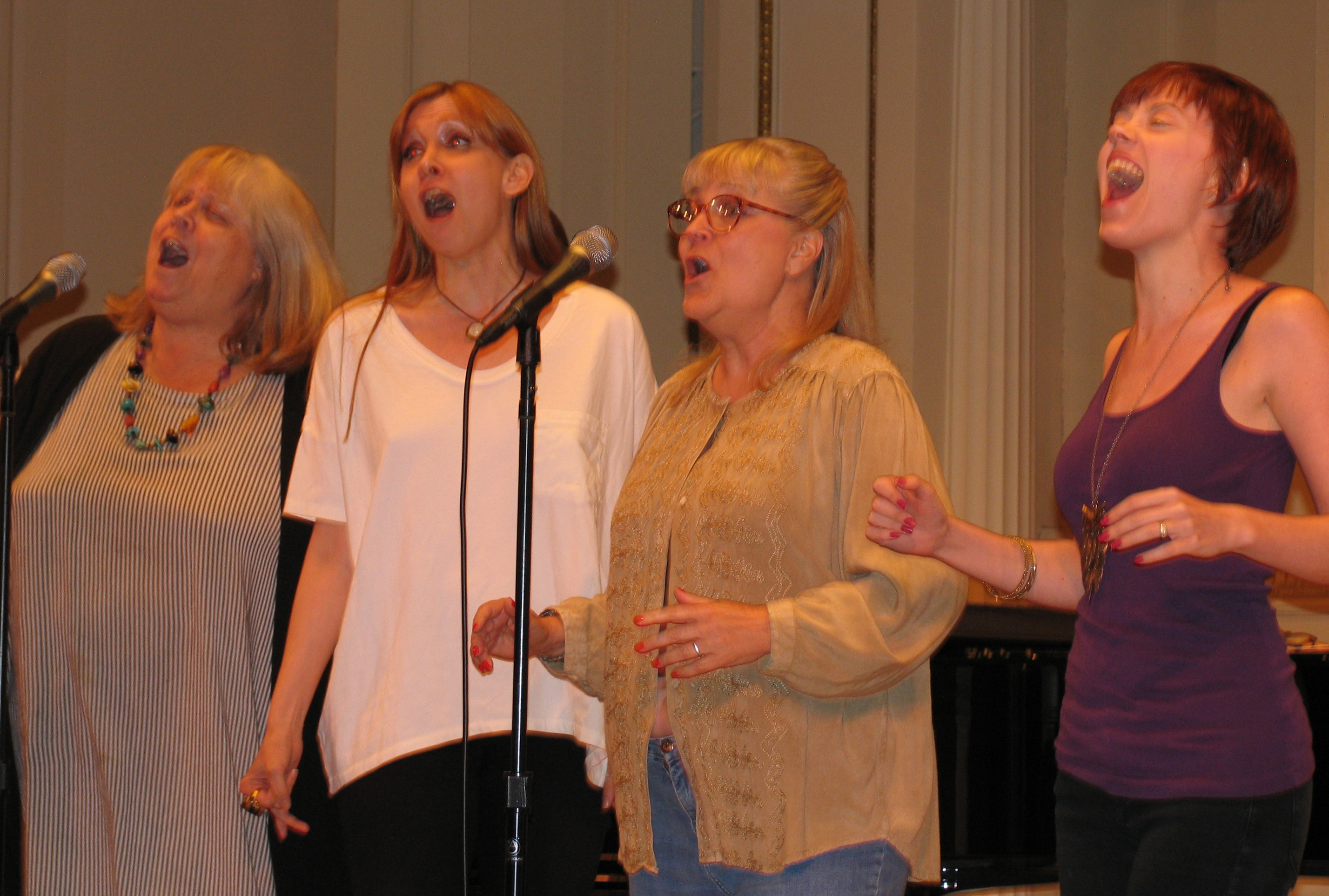
Debbi Whiting: Beyond being Margaret Whiting’s daughter, we had no clue what to expect from Debbi co-hosting this evening. Frankly, we thought that K.T. Sullivan would do most of the heavy lifting from both a hostessing and performing standpoint. Au contraire! Debbi was witty, funny, and a most engaging hostess, plus she performed a very, very fun tribute to Margaret’s time with the legendary 4 Girls 4. Gamely slapping a huge black bow on her head, Debbi was “Rose Marie”; Heather MacRae was “Rosemary Clooney”; Lauren Fox was “Helen O’Connell”; and glamorous, big-voiced Carole Bufford (who managed to squeeze in four gown changes into the course of the evening) was “Margaret Whiting.” Debbi and K.T. really kept the proceedings going at a brisk pace, and peppered the entire evening with humor and high spirits. The one unabashedly tearjerking moment, though, was when Debbi spoke movingly of her mother’s final days, and how it brought Margaret such happiness when she learned that her recording of “Time After Time” had been used in the hit film, Julie & Julia. After that, Debbi recounted, her mother would watch the film over and over again on DVD, always asking to see “the pancake lady” one more time. The final time they watched the film together, and her glorious voice once again came through the speakers, Margaret turned to her daughter and said, “Somebody really likes me!”
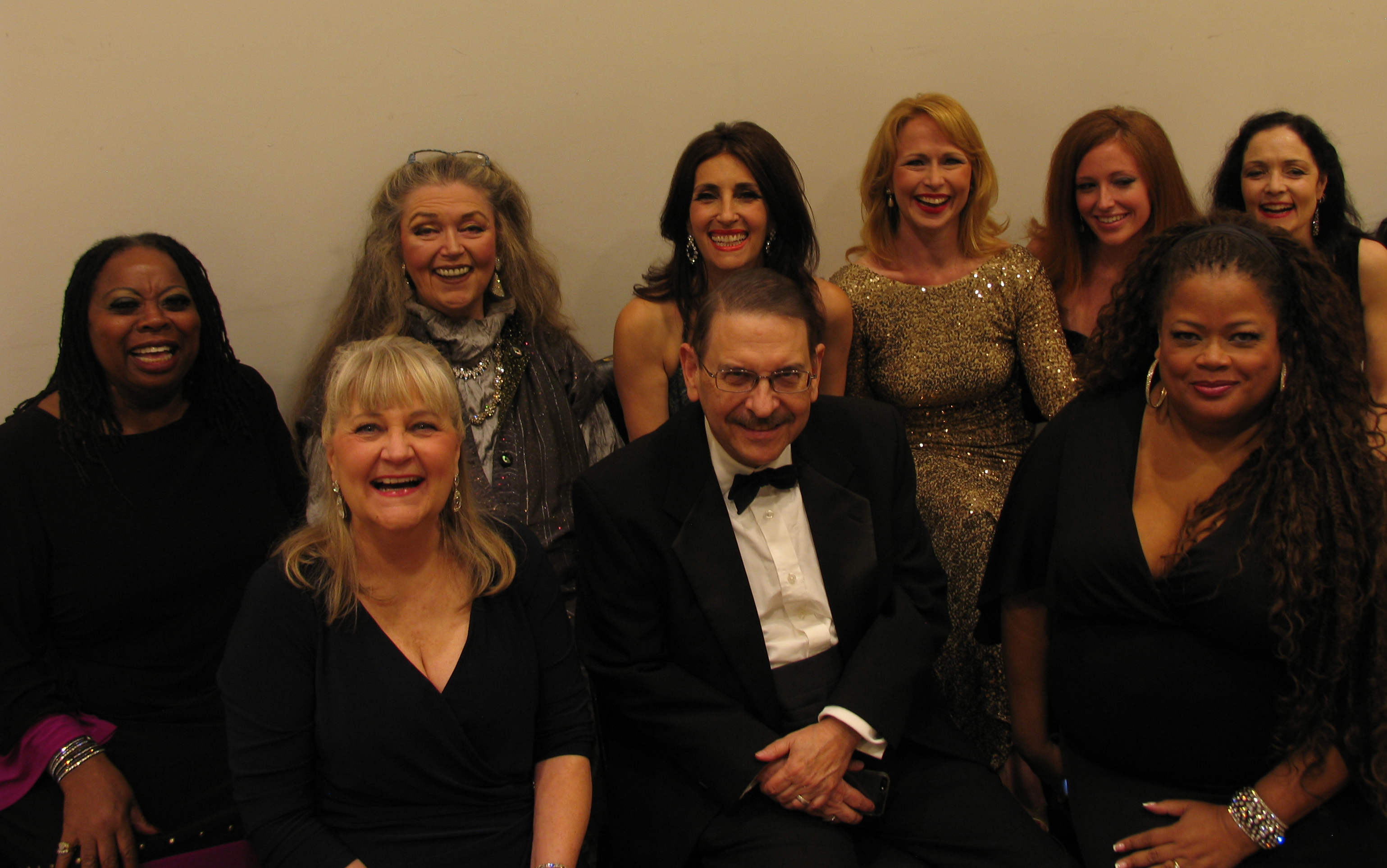
They still do. They LOVE Margaret Whiting, and the feeling was palpable all evening. It was evident, not only in the joy these performers obviously took in being there and paying tribute to a lovely woman and a tremendous singer, but also in the extreme care which was obviously taken to mount a respectful, but also hugely entertaining, evening of song. It was just brilliant, and we are so grateful that we were able to attend.
|



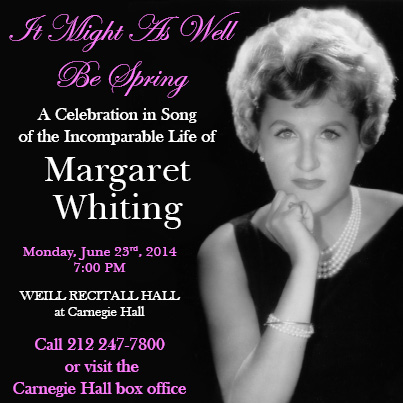
 Baby Jane Dexter
Baby Jane Dexter

